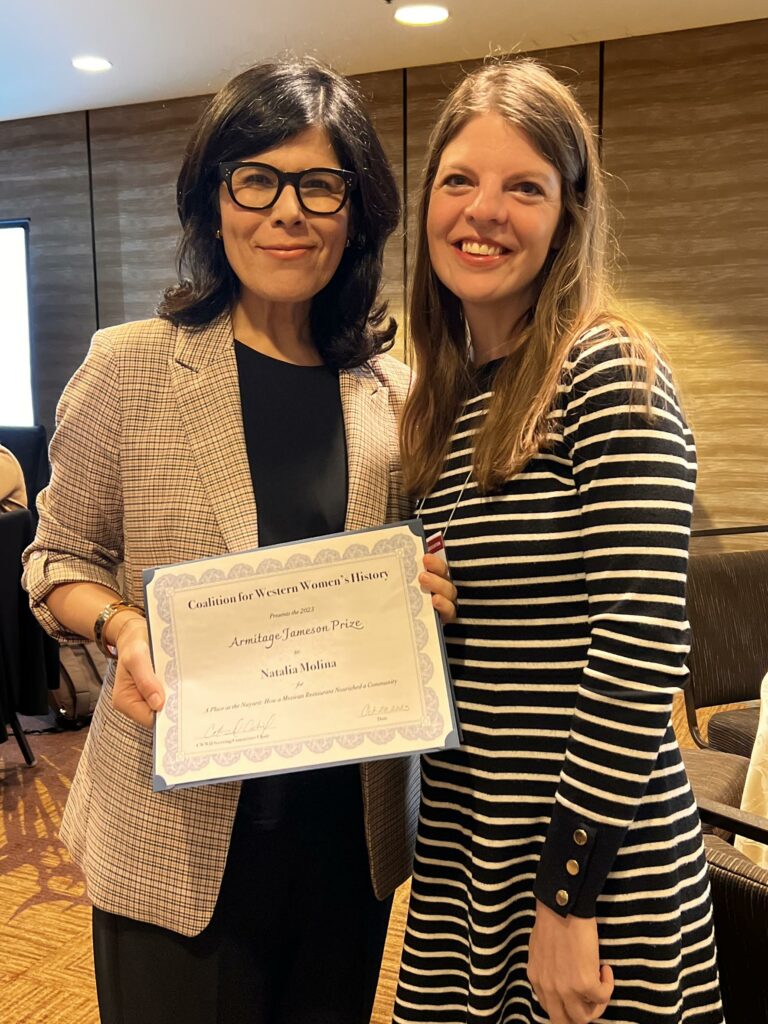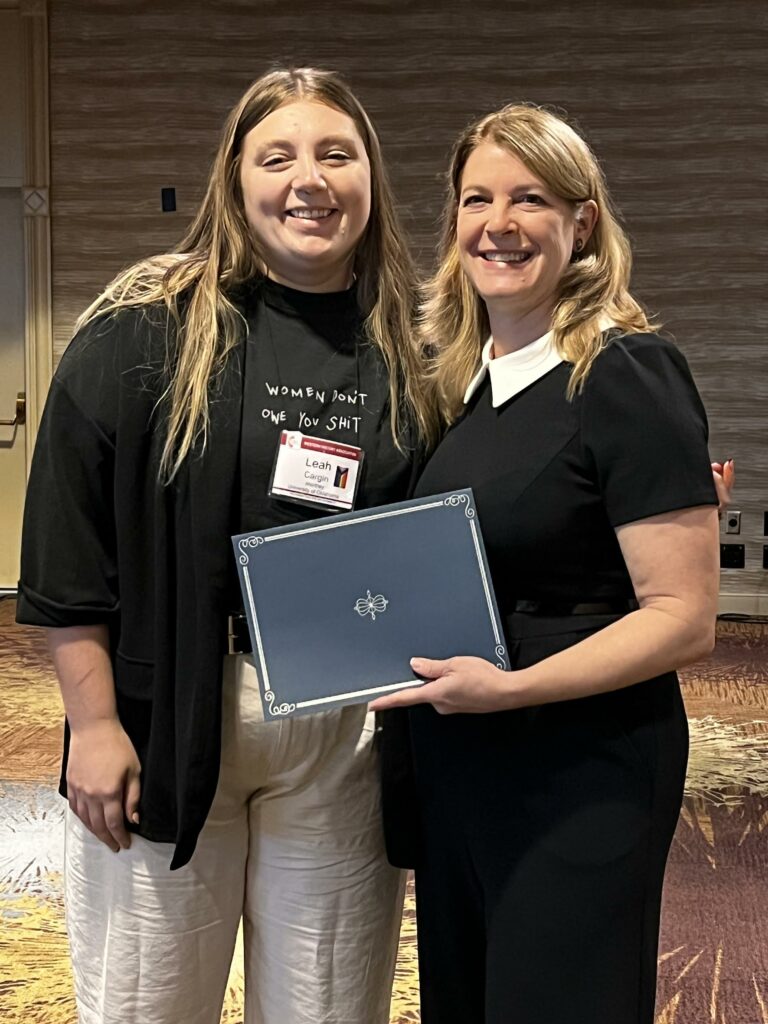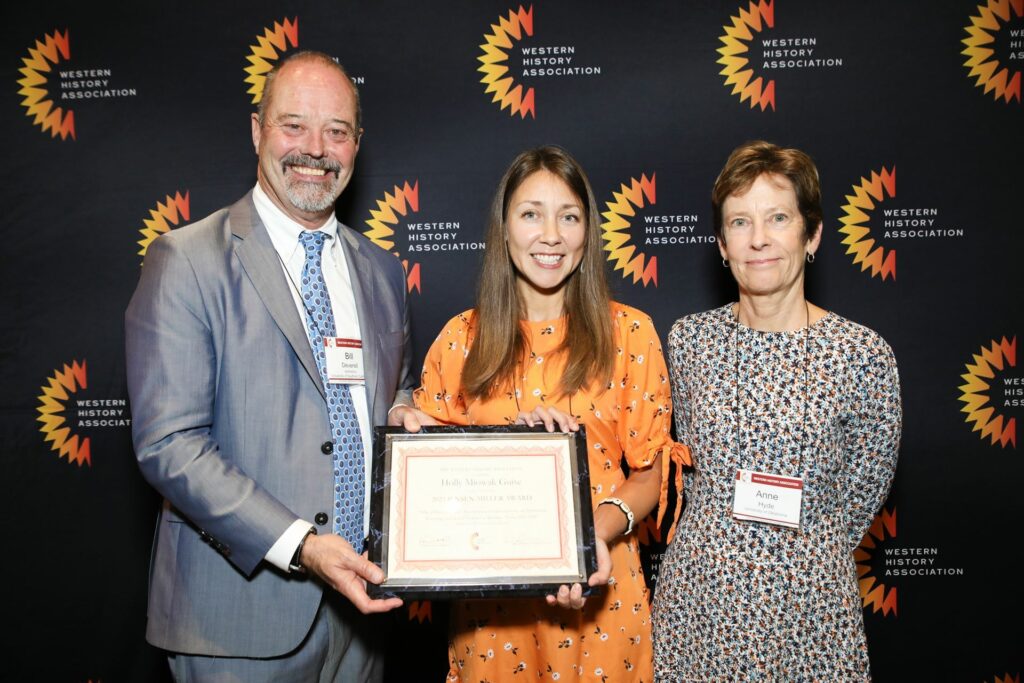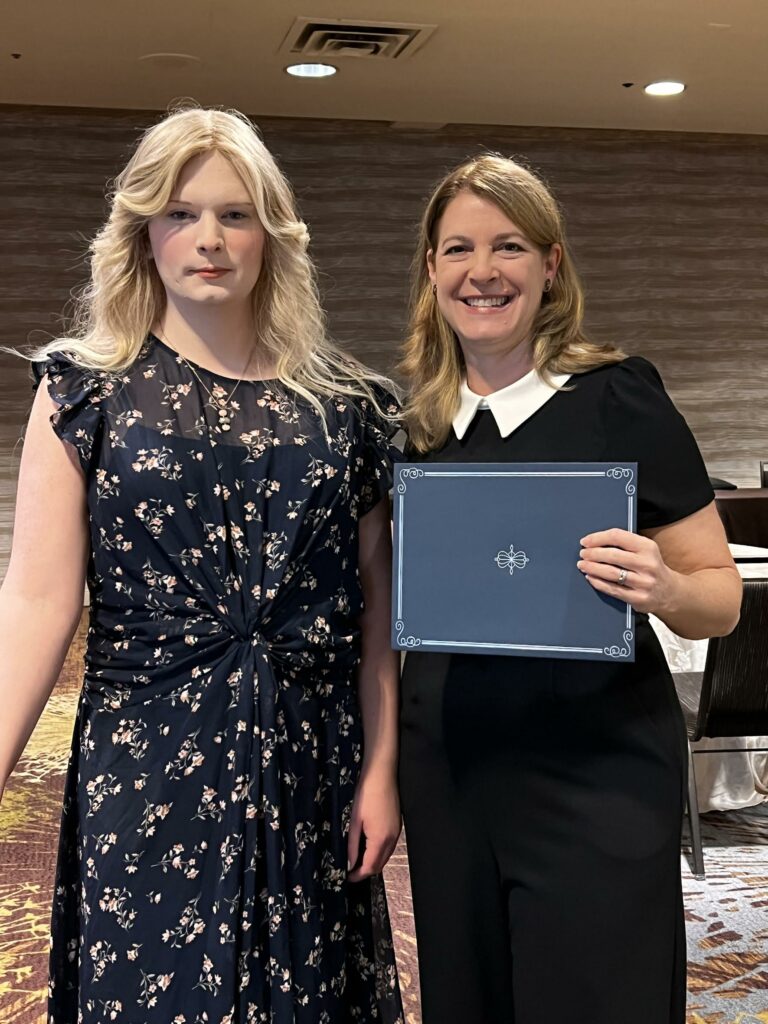We offer four annual awards to recognize excellence in the history of women, gender, and/or sexuality in the North American West. The Armitage-Jameson Prize awards the best monograph or edited volume; the Irene Ledesma Prize supports graduate student research; and the Jensen-Miller Award selects the best article or chapter in an edited volume. We also offer a CWWH-WHA Conference Grant for students in the field to present at the annual Western History Association conference.
Armitage-Jameson Prize
The Coalition for Western Women’s History awards the Armitage-Jameson Prize annually for the most outstanding monograph or edited volume published in western women’s, gender, and sexuality history. First given in 2010, the prize is named in honor of Dr. Susan Armitage and Dr. Elizabeth Jameson for their pioneering work in the field of western women’s history.

2023 Award Winner
Natalia Molina | University of Southern California
A Place at the Nayarit: How a Mexican Restaurant Nourished a Community (Berkeley: University of California Press)
About
- The Armitage-Jameson Prize for the most outstanding monograph or edited volume published in women’s, gender, and/or sexuality history in the North American West.
- The award recipient will receive $1000 and the publishing press will receive a certificate.
- The award will be presented at the CWWH Breakfast at the annual Western History Association conference.
Eligibility
- We define the North American West as relevant geographic regions of Canada and Mexico, as well as the United States territories, past and present.
- The nominated book must have been published in the year prior to the award nomination.
Deadline
- The deadline for award submission is June 1, annually.
- Presses are limited to the nomination of five titles and should send a copy of the nominated book to each member of the committee by June 1, annually.
- In the event that June 1 falls on a weekend, the deadline is the following Monday.
- Late submissions will not be considered.
Award Committee
- Jennifer Holland (Chair) | 610 NW 17th Street | Oklahoma City, OK 73103
- Patti Loughlin | 6101 N. Golden Eagle Drive | Tucson, AZ 85750
- Rebecca Hunt | 2502 W. 32nd Avenue | Denver, CO 80211
Past Recipients
2022: Nicole Perry, Policing Sex in the Sunflower State: The Story of the Kansas State Industrial Farm for Women (Lawrence: University Press of Kansas, 2021).
2021: Jennifer L. Holland, Tiny You: A Western History of the Anti-Abortion Movement (Berkeley: University of California Press, 2020).
2020: Brianna Theobald, Reproduction on the Reservation: Pregnancy, Childbirth, and Colonialism in the Long Twentieth Century (University of North Carolina Press, 2019).
2019: Erika Pérez, Colonial Intimacies: Interethnic Kinship, Sexuality, and Marriage in Southern California, 1769-1885 (University of Oklahoma Press, 2018).
2018: Lynne Marie Getz, Abolitionists, Doctors, Ranchers, and Writers: A Family Journey through American History (University Press of Kansas, 2017).
2017: Katrina Jagodinsky, Legal Codes and Talking Trees: Indigenous Women’s Sovereignty in the Sonoran and Puget Sound Borderlands, 1854-1946 (Yale University Press, 2016).
2016: Honor Sachs, Home Rule: Households, Manhood and National Expansion on the Eighteenth- Century Kentucky Frontier (Yale University Press, 2015).
2015: Elsie Paul (edited by Paige Raibmon and Harmony Johnson), Written as I Remember It: Teachings (??ms ta?aw) from the LIfe of a Sliammon Elder (University of British Columbia Press, 2014).
2014: Elizabeth R. Escobedo, From Coveralls to Zoot Suits: The Lives of Mexican American Women on the World War II Home Front (University of North Carolina Press, 2013).
2013: Anne M. Butler, Across God’s Frontiers: Catholic Sisters in the American West, 1850-1920 (University of North Carolina Press, 2012).
- (Honorable Mention for 2013): Mary S. Melcher, Pregnancy, Motherhood, and Choice in Twentieth Century Arizona(University of Arizona Press, 2012).
2012: Sarah Carter and Patricia McCormick, eds., Recollecting: Lives of Aboriginal Women of the Canadian Northwest and Borderlands (Athabascan University Press, 2011).
2011: Marilyn S. Blackwell & Kristen Oertel, Frontier Feminist: Clarina Howard Nichols and the Politics of Motherhood (University Press of Kansas, 2010).
2010: Margaret Jacobs, White Mother to a Dark Race: Settler Colonialism, Maternalism, and the Removal of Indigenous Children in the American West and Australia, 1880-1940 (University of Nebraska Press, 2009).
Irene Ledesma Prize
The Irene Ledesma Prize is a cash award of $1000 for graduate student research in gender and western women’s history. The Irene Ledesma Prize is named in honor of Dr. Ledesma’s important contributions to the fields of Chicana and working-class history.

2023 Award Winner
Leah Cargin | University of Oklahoma
“Intimate Urbanization: Women’s Reproductive Health and Urbanization in Twentieth-Century Mexico City”
About
- The $1,000 prize supports travel to collections or other research expenses related to histories of women and gender in the North American West.
- The recipient will also receive a one-year complimentary membership to the CWWH.
The award will be presented at the CWWH Breakfast at the annual Western History Association conference.
Eligibility
- Applicants must be enrolled in a PhD program at the time off application.
Deadline
- The deadline for award submission is August 15, annually.
- In the event that August 15 falls on a weekend, the deadline is the following Monday.
Criteria
The Committee evaluates proposals according to the following criteria:
- How well the applicant stated her/his research question and the significance of the overall project.
- How well the applicant demonstrated her/his knowledge of the primary source materials related to the proposal.
- How well the applicant framed her/his project in terms for the broader theoretical/historiographical issues significant to the topic.
- How well the proposal addressed the issues of gender and/or women’s history in the North American West.
How well the proposed budget details the applicant’s stated research agenda.
Application Procedure
To apply, submit one copy of each of the following (as a single PDF file) to each member of the committee:
- Cover sheet with your name, contact information, project tile, name of reference
- Curriculum Vitae (5-page maximum)
- A brief description of the research project and an explanation of how the prize funds would support the research (not exceeding three double-spaced pages, addressing the above criteria)
- A line-item budget
Letter of support from the student’s dissertation advisor
Award Committee
- Danae Jacobson (Chair) | Colby College | danae.jacobson@colby.edu
- Philis Barragán Goetz | Texas A&M University, San Antonio | pbarragan@tamusa.edu
- Sasha Suarez | University of Wisconsin, Madison | smsuarez@wisc.edu
Past Recipients
2022: Amy Reid (University of California at Santa Cruz)
Grandmother’s Garden (documentary)
2021: Michelle Martin (Historian, Museum Consultant)
“Gathering Around A New Fire: The Bemo Family, Interracial Marriage, Race and Power in the Mvskoke Nation, 1870-1897”
2020: Caitlin Sackrinson (Ph.D. Candidate, Brandis University)
“Land in Practice, Partnership and Ownership Norwegian-American Women in the Southern Minnesota Plains in the Mid-Nineteenth to Early Twentieth Century”
2019: Claire Thomson (Ph.D. Candidate, University of Alberta)
“To hell with this, I’m going back to Wood Mountain”: Lakota People and Lakota Thamakhoche (Lakota Country) in the US-Canada Borderlands”
2018: Jill Falcon Mackin (Ph.D. Candidate, Montana State University)
“Miinigoowiziwin (That which is given to us): Changing Anishinaabe Food Systems, 1780-1920”
2017: Tiffany Jasmin Gonzalez (Ph.D. Candidate, Texas A&M University)
“Representation for a Change: The Impact of Chicanas in Government and the Civil Rights Movement in Texas”
2016: Margaret Neubauer (Ph.D. Candidate, Southern Methodist University)
“American Indian Child Welfare, Activism, and Sovereignty in the Twentieth Century”
2015: Meggan L. Bilotte (Ph.D. Candidate, University of Wisconsin-Madison)
“Migrant Madres and Sugar Babies: Public Health and Family in the Sugar Beet Fields of Northern Colorado”
2014: Jennifer McPherson (Ph.D. Candidate, University of New Mexico)
“Not Your Mother’s PTA: Parents, Public Authority, and the Professionalization of Politics”
2013: Brianna Theobald (Ph.D. Candidate, Arizona State University)
“‘The Simplest Rules of Motherhood’: Settler Colonialism and the Regulation of American Indian Reproduction, 1910-1976”
2012: Katherine Massoth (Ph.D. Candidate, University of Iowa)
“‘As in the Custom of the Country’: Cultural Practices and Ethnic Identity in Arizona and New Mexico, 1846-1941”
2011: Larisa Veloz (Ph.D. Candidate, Georgetown University)
“Forgotten Migrants: Mexican Women and Migrant Families, 1930-1965.”
2010: Annie Hanshew (Ph.D. Candidate, University of Utah)
”‘Mothering A Good Forest Fire Isn’t Easy:’ Smokejumpers, Masculinity, and Forest Fires in the American West”
2009: Margie Brown-Coronel (Ph.D. Candidate, University of California, Irvine)
“Beyond the Rancho: Four Generations of del Valle Women in Southern California, 1830-1930”
2008: Lilia Raquel D. Rosas (Ph.D. Candidate, University of Texas at Austin)
“(De)sexing Prostitution: Race, Politics, and the Reform of Sex Work in Progressive San Antonio, 1889-1920)”
2007: Christine Christensen (Ph.D. Candidate, University of California, Irvine)
“‘Mujeres Publicas’: Euro-American Prostitutes and Reformers at the California-Mexico Border (1914-1929)”
2006: Robin Conner (Ph.D. Candidate, Emory University)
“Civilizing Soldiers: Gender and Domesticity in the Western Army”
2005: Helen McLure (Ph.D. Candidate, Southern Methodist University)
“‘I Suppose You Think Strange the Murder of Women and Children’: Whitecapping and Lynching in the U.S. West, Midwest, and Southwest, 1850-1930”
2004: Maritza De La Trinidad (Ph.D. Candidate, University of Arizona)
“Collective Outrage: Mexican American Activism and the Fight for Educational Equality”
2003: Laurie Arnold (Ph.D. Candidate, Arizona State University)
“The Colville Tribes and Termination, Divisions and Gender”
2002: Katherine Benton (Ph.D. Candidate, University of Wisconsin, Madison)
“What About Women in the ‘White Man’s Camp?’: Gender, Nation, and the Redefinition of Race in Cochise County, Arizona, 1853-1941”
2001: Adriana Ayala (Ph.D. Candidate, University of Texas, Austin)
“The Significance of Race and Gender in Women’s Organizations in San Antonio, Texas, 1920s-1940”
2000: Elizabeth Escobedo (Ph.D. Candidate, University of Washington)
“Forgotten Youth: Adolescence and the Mexican American Woman in WWII Los Angeles”
1999: Dedra McDonald (Ph.D. Candidate, University of New Mexico)
“Negotiated Conquests: Domestic Servants and Gender in the Spanish and Mexican Borderlands, 1598-1860”
Jensen-Miller Award
The Western History Association offers the Jensen-Miller Award for the best article in the field of women and gender in the North American West. The Award is named in honor of Dr. Joan Jensen and Dr. Darlis Miller for their significant contributions to the field of western women’s history. The Coalition began awarding the Jensen-Award Miller in 1990 and administered the prize until the WHA became the facilitator in 2009.

2023 Award Winner
Holly Miowak Guise | University of New Mexico
“‘Who is Doctor Bauer?’: Rematriating a Censored Story on Internment, Wardship, and Sexual Violence in Wartime Alaska, 1941-1944,” Western Historical Quarterly (Summer 2022)
About
- No time period restrictions apply, and essays will be judged on their significance to the field, their contributions to knowledge, and their literary quality.
- The Charles Redd Center for Western Studies at Brigham Young University funds this $500 cash prize and provides a plaque to the author of the winning essay. The publisher will receive a certificate.
- The WHA office sends notifications to selected award recipients at the end of August, annually.
Eligibility
- Any WHA member, as well as the publisher or author of the essay, may nominate an essay.
- The nominated article must have been published in a scholarly journal or edited volume in the year prior to the award nomination.
Deadline
- The 2024 Awards Cycle opens January 15, 2024
- Award submissions must be emailed or postmarked by August 15, 2024
Application Procedure
- Unless a journal editor notifies you about nominating your work, authors must submit a copy of the journal, an offprint, or a photocopy to each member of the prize committee.
- Journals, editors, and authors may submit nominations electronically through the email addresses provided below.
- Submissions must be one pdf file and include the cover page, copyright page, and table of contents of journals and anthologies in addition to the article/essay.
Award Committee
- Celeste Menchaca (Chair) | University of Southern California | cmenchac@usc.edu
- Julia Ornelas-Higdon | California State University, Channel Islands | julia.ornelas-higdon@csuci.edu
- Jonna Perrillo | University of Texas at El Paso | jperrillo@utep.edu
Past Recipients, WHA (2009 – present)
2023: Holly Miowak Guise, “‘Who is Doctor Bauer?’: Rematriating a Censored Story on Internment, Wardship, and Sexual Violence in Wartime Alaska, 1941-1944,” Western Historical Quarterly (Summer 2022)
2022: Lina-Maria Murillo, “Birth Control, Border Control: The Movement for Contraception in El Paso, Texas, 1936-1940,” Pacific Historical Review (Summer 2021)
2021: Celeste Menchaca, “Staging Crossings: Policing Intimacy and Performing Respectability at the U.S.-Mexico Border, 1907-1917,” Pacific Historical Review (Spring 2020)
2020: Jordan Biro Walters, “‘So Let Me Paint’: Navajo Artist R.C. Gorman and the Artistic, Native, and Queer Subcultures of San Francisco, California,” Pacific Historical Review (Summer 2019)
2019: Natalia Molina, “Deportable Citizens: The Decoupling of Race and Citizenship In the Construction of the ‘Anchor Baby,’” in Deportation in the Americas: Histories of Exclusion and Resistance, Kenyon Zimmer and Cristina Salinas, eds. (Texas A&M Press, 2018)
2018: Beth Lew-Williams for “‘Chinamen’ and ‘Delinquent Girls’: Intimacy, Exclusion and a Search for California’s Color Line,” Journal of American History (December 2017)
2017: Katrina Jagodinsky for “A Tale of Two Sisters: Family Histories from the Strait Salish Borderlands,” Western Historical Quarterly (Summer 2016)
2016: Katherine Ellinghaus, “‘A Little Home for Myself and Child’: The Women of the Quapaw Agency and the Policy of Competency,” Pacific Historical Review (August 2015)
2015: Verity McInnis, “Indirect Agents of Empire: Army Officers’ Wives in British India and the American West, 1830-1875,” Pacific Historical Review (August 2014)
2014: Sarah M.S. Pearsall, “Having Many Wives in Two American Rebellions,” American Historical Review (October 2013).
2013: Grace Peña Delgado, “Border Control and Sexual Policing: White Slavery and Prostitution along the U.S.-Mexico Borderlands, 1903-1910,” Western Historical Quarterly (Summer 2012).
2012: Hilary A. Hallet, “Based on a True Story: New Western Women and the Birth of Hollywood,” Pacific Historical Quarterly (May 2011).
2011: Jennifer Thigpen, “’You Have Been Very Thoughtful Today‘: The Significance of Gratitude and Reciprocity in Missionary-Hawaiian Gift Exchange,” Pacific Historical Review (November 2010).
2010: Lori A. Flores, “An Unladylike Strike Fashionably Clothed: Mexicana and Anglo Women Garment Workers Against Tex-Son, 1959–1963,” Pacific Historical Review (August 2009).
2009: Kathleen DuVal, “Indian Intermarriage and Metissage in Colonial Louisiana,” William and Mary Quarterly (April 2008).
Past Recipients, The Coalition (1990 – 2008)
2008: Elizabeth R. Escobedo, “The Pachuca Panic: Sexual and Cultural Battlegrounds in World War II Los Angeles,” Western History Quarterly (Summer 2007).
2007: Sarah Carter, “Britishness, Foreignness, Women, and Land in Western Canada, 1880s-1920s,” Humanities Research: The Journal of the Humanities Research Centre for Cross-Cultural Research at the Australian National University (2006).
2006: Dee Garceau-Hagen, “Finding Mary Fields: Race, Gender and the Construction of Memory,” in Portraits of Women in the American West (Routledge, 2005).
2005: Adele Perry, “The Autocracy of Love and the Legitimacy of Empire: Intimacy, Power, and Scandal in Nineteenth-Century Metlakahtlah,” Gender and History (August 2004).
2004: Ann R. Gabbert, “Prostitution and Moral Reform in the Borderlands: El Paso, 1890-1920,” Journal of the History of Sexuality (October 2003).
2003: Margaret D. Jacobs, “The Eastmans and the Luhans: Interracial Marriage between White Women and Native American Men, 1875-1935,” Frontiers: A Journal of Women’s Studies (2002).
2002: Laura Jane Moore, “Elle Meets the President: Weaving Navajo Culture and Commerce in the Southwestern Tourist Industry.” Frontiers: A Journal of Women’s Studies (2001).
2001: Lynn M. Hudson, “‘Strong Animal Passion’ in the Gilded Age: Race, Sex, and a Senator on Trial,” Journal of the History of Sexuality (January/April 2000).
2000: Mary Ann Irwin, “‘Going About and Doing Good’: The Politics of Benevolence, Welfare, and Gender in San Francisco, 1850-1880,” Pacific Historical Review (August 1999).
1999: Jean Barman, “Taming Aboriginal Sexuality: Gender, Power, and Race in British Columbia, 1850-1900,” British Columbia Studies (Autumn/Winter 1997/1998).
1998: Catherine A. Cavanaugh, “‘No Place for a Woman’: Engendering Western Canadian Settlement,” Western Historical Quarterly (Winter 1997).
1997: James F. Brooks, “‘This Evil Extends Especially…to the Feminine Sex’: Negotiating Captivity in the New Mexico Borderlands,” Feminist Studies (Summer 1996).
1996: Irene Ledesma, “Texas Newspapers and Chicana Workers’ Activism, 1919-1974,” Western Historical Quarterly (November 1995).
1995: Amy Kaminsky, “Gender, Race, Raza,” Feminist Studies (1994).
1994: Susan Lee Johnson, “‘A Memory Sweet to Soldiers’: The Significance of Gender in the History of the ‘American West,’” Western Historical Quarterly (November 1993).
1993: Antonia I. Castañeda, “Women of Color and the Rewriting of Western History: The Discourse, Politics, and Decolonization of History,” Pacific Historical Review (1992).
1992: Peggy Pascoe, “Race, Gender, and Intercultural Relations: the Case of Interracial Marriage,” Frontiers: A Journal of Women Studies (1991).
1991: Carol Cornwall Madsen, “‘At Their Peril’: Utah Law and the Case of Plural Wives, 1850-1900,” Western Historical Quarterly (November 1990).
CWWH-WHA Graduate Student Conference Grant
Thanks to a generous donation from former WHA President and Coalition co-founder Dr. Elizabeth Jameson, the CWWH created a fund to support graduate student conference attendance. The Coalition offers the a CWWH-WHA Conference Grant for CWWH graduate student members who are registered to attend the annual WHA Conference. This grant continues the Coalition’s commitment to supporting graduate students whose research and teaching interests in the history of the North American West engages in the analysis of women, gender, and sexuality.

2023 Award Winner
Janice Joy Dishner | University of Colorado, Boulder
“Repairing the Memory of Mission San Sabá, and the Perennial Necessity of Paranoia on the Texas Frontier”
About
- The grant of $500 may be used for travel, registration, and lodging at the WHA. The recipient will also receive a ticket to the CWWH Breakfast, where they will receive the award.
Eligibility
- The Coalition is open to persons of all genders, sexualities, and races/ethnicities who seek to support and advance the scholarship on women, gender, and sexuality in the North American West.
- Presence on the program is not required.
Deadline
- The deadline for the application and letter of reference is September 30, annually.
- In the event that September 30 falls on a weekend, the deadline is the following Monday.
Application Procedure
- Applications should include:
- Your full name
- Affiliation and year in your program
- Address, phone number, and email address
- Registration status for annual WHA conference
- Brief description of how your research engages analyses of gender and/or reflects your commitment to advancing the scholarship on women, gender, and sexuality in the North American West (250 words maximum)
- Send your application as a PDF directly to Cathleen Cahill, Coalition Chair, via email with “CWWH Grant Competition” in the subject line.
- Letter of reference from a faculty mentor that addresses that ways in which your research engages analyses of gender and/or reflects your commitment to the history of women and gender in the American West, sent directly to Cathleen Cahill via email.
Past Recipients
2023: Janice Joy Dishner | University of Colorado, Boulder
2022: Kim Kohn McLain | Montana State University
Our awards are funded through the generosity of our membership.
We encourage you to consider donating to any of our prizes.